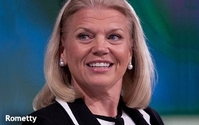IBM CEO Rometty Details Mobile Strategies, Focuses On Data, Engagement
- by Laurie Sullivan @lauriesullivan, February 26, 2014
 IBM
Chairman and CEO Ginni Rometty outlined the company's mobile strategy for Watson, the company's cognitive computer. She called mobile the future, the next era cognitive computing, and said the
world has moved into real-time use of data where "battles are won and lost in microseconds."
IBM
Chairman and CEO Ginni Rometty outlined the company's mobile strategy for Watson, the company's cognitive computer. She called mobile the future, the next era cognitive computing, and said the
world has moved into real-time use of data where "battles are won and lost in microseconds."
At the Mobile World Congress in Barcelona, Rometty called on software developers to build mobile applications for consumers and businesses. She said mobile services will focus on secure transactions, such as purchases, accessing health care, and any transaction requiring human-to-machine or machine-to-machine interactions. Backed by her predictions, she challenged developers to step up to create businesses based on the next era of computing.
During the next three months, the IBM Watson Mobile Developer Challenge invites mobile developers and entrepreneurs to share their best ideas to build and develop mobile apps into prototypes. Three winners will join the Watson Ecosystem Program. The winners will work with IBM's recently launched global consulting practice, IBM Interactive Experience, to receive design consulting and support from IBM experts to develop a viable commercial app. The support includes seed funding.
Calling this time the most exciting and disruptive in history, Rometty named three trends that are reshaping technology: data as the world's next natural resource, IT services and cloud computing, and engagement that will forever change how businesses understand people as individuals.
Some 80% of the apps built today are in the cloud, and a quarter of the apps built by 2016 will become cloud-based, Rometty said. One in three IBM clients are trying to find ways to monetize data and develop a new business.
Other meaningful stats: about 50% of all purchases are influenced by digital research. The number of people willing to give up their GPS location has doubled in the past year. Some 80% of consumers would trade personal information if given something in return, and $1 trillion of additional online retail sales will become available if people are comfortable with how companies secure their personal information, Rometty said.


